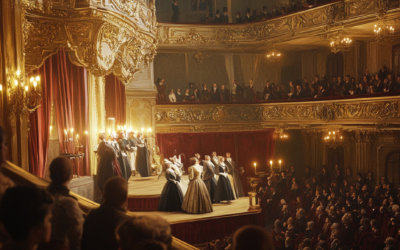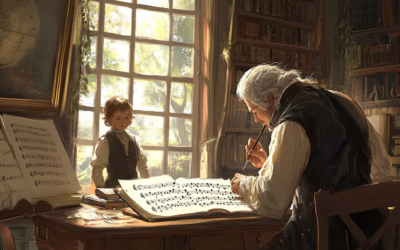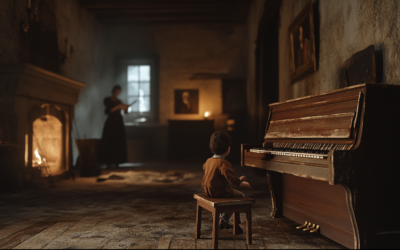The Myth of Mozart:
Debunking the Romantic Virtuoso Image
The image of Mozart as a Romantic-era virtuoso is a misleading anachronism, fuelled by 19th-century propaganda. Wolfgang was no transcendental pianist, but a product of an era where music was more galant than heroic.
Mozart: The Fall of the Gods
This book offers a fresh and critical look at the life of Wolfgang Amadeus Mozart, challenging the myths that have surrounded him for centuries. We strip away the romanticised image of the “natural genius” and delve into the contradictions within Mozart’s extensive biographies. Backed by nearly 2,000 meticulously sourced citations, this work invites readers to explore a deeper, more complex understanding of Mozart. Perfect for those who wish to question the traditional narrative, this biography is a must-read for serious music lovers and historians.
"Mozart’s brilliance was less about transcendental technique and more about the improvisational and expressive subtleties of the galant style."
Mozart: The Fall of the Gods
When we picture the young Mozart, many of us are drawn to the idea of a child prodigy touring Europe, dazzling audiences with his musical prowess. This image, however, is largely a fabrication. It has been shaped by Romantic ideals, associating Mozart with the virtuosos of the early 19th century and the great artists of the Romantic era. Yet, Wolfgang was not a 19th-century pianist whose feats of brilliance left audiences awestruck. Such an image is an anachronism.
The phenomenon of the virtuosic performer as we understand it today began only in the early 1800s. Figures like Paganini and Liszt came to embody the idea of superhuman performers, but this was long after Mozart’s time. By 1840, the piano and the virtuoso had become everyday realities. Mozart, however, belonged to a different era altogether.
Despite this, Wolfgang was later claimed as a symbol by Romantic-era virtuosos. Music publishers, eager to modernise his repertoire, transcribed his works for the piano—music originally written for the harpsichord. Young pianists practised the Minuets from Nannerl’s notebook, hoping to follow in Mozart’s footsteps. Yet, the 19th-century obsession with technical perfection and overcoming challenges was far removed from the world of 18th-century galant music.
“Mozart’s brilliance was less about transcendental technique and more about the improvisational and expressive subtleties of the galant style.”
His improvisational skills, highly praised in his time, were considered emblematic of an absolute and unparalleled mastery. However, this mastery had little to do with the virtuosic acrobatics of the Romantic pianist. It was about understanding and elaborating upon the galant compositions of composers like Telemann and Johann Christian Bach, both of whom had a direct influence on the young Wolfgang.
Mozart’s journey as a performer was marked by improvisation and ornamentation, not the transcendental feats of Romantic virtuosos. In fact, much of the technical brilliance that defined later centuries was still in its infancy during Mozart’s time. His early years as a musician saw him interpreting galant works, not composing transcendentally complex pieces. The romanticisation of Mozart’s abilities has led to a misinterpretation of his music and his era.
You May Also Like
The Vienna Disaster
The failure of La Finta Semplice in Vienna was a turning point for the Mozart family, revealing the cracks in the facade of Wolfgang’s prodigious reputation and prompting a desperate escape to Italy in search of redemption.
From Innsbruck to Bolzano
From Innsbruck to Bolzano, the Mozart family’s journey was a blend of strategic networking and missed opportunities, revealing the challenges of securing fame in 18th-century Europe.
The Myth of Mozart’s Sight-Reading Genius
Mozart’s so-called sight-reading miracles were less about supernatural talent and more about clever improvisation, as two key 18th-century witnesses make clear.
The Hidden Legacy of Michael Haydn
Mozart’s Symphony No. 37, K.444, is more Haydn than Mozart. How did this happen? A story of deception and misattribution unfolds.
The Myth of Mozart’s Education
For centuries, Wolfgang Amadeus Mozart has been celebrated as a musical prodigy, effortlessly composing masterpieces from a young age. However, when we peel back the layers of myth surrounding his early education, a different picture emerges—one in which his father, Leopold Mozart, plays a far more controlling and influential role than is often acknowledged. This article explores the true nature of Mozart’s education, examining how much of his early works can be attributed to his own genius, and how much was the product of his father’s meticulous and often self-serving guidance. Was Wolfgang’s brilliance entirely his own, or was it a crafted image designed by Leopold?
The Myth of Mozart’s Childhood
Mozart’s childhood is often romanticised, but behind the myth lies a more complex reality. This post explores the hidden dynamics within his family, questioning the traditional narrative of Mozart's early years and shedding light on the forgotten role of his sister,...







